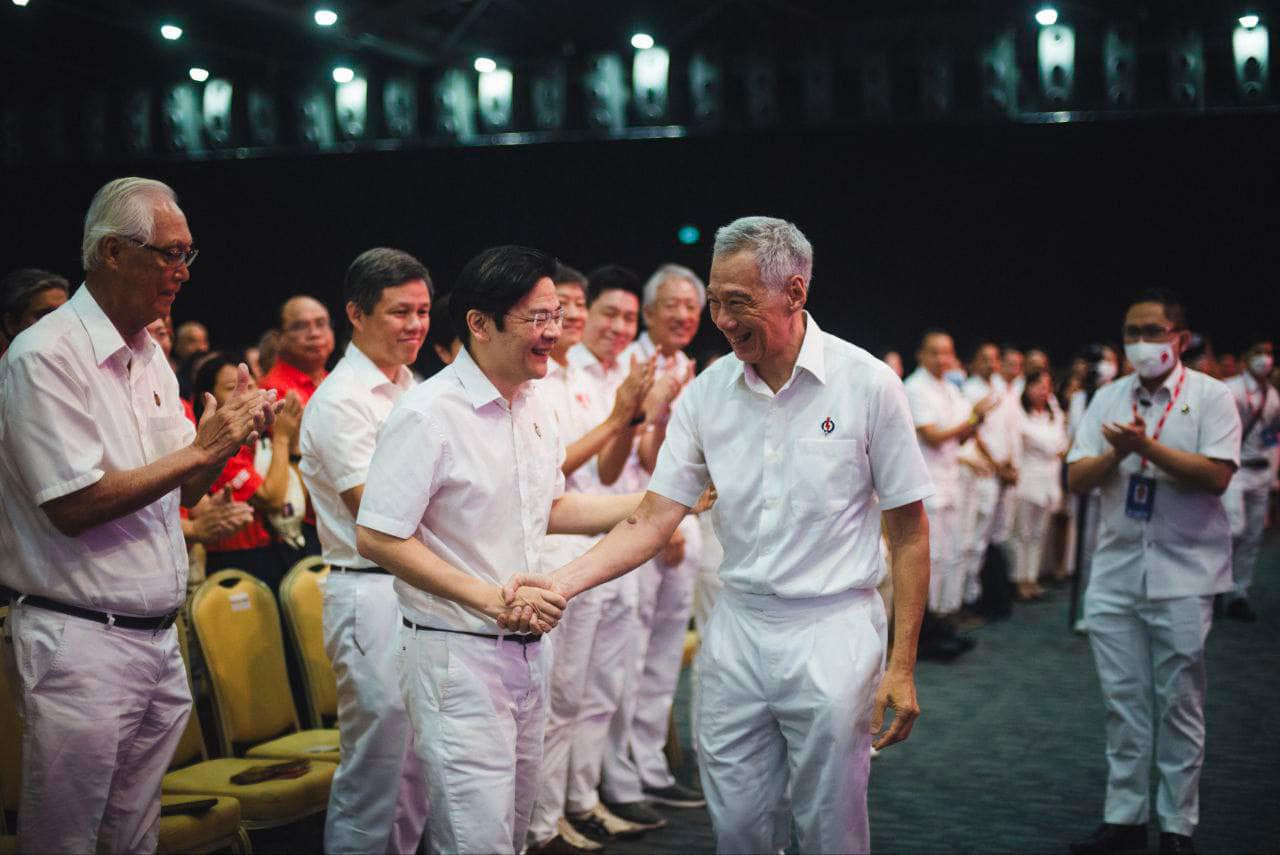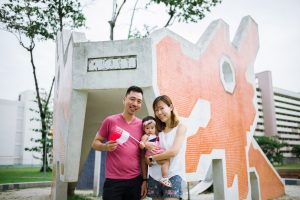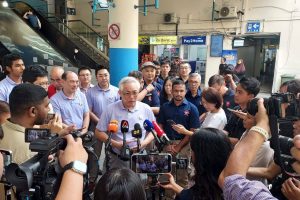Top image: Lawrence Wong / Facebook
A year from now, Singapore will have a new prime minister. Deputy Prime Minister Lawrence Wong is set to take over the baton from Prime Minister Lee Hsien Loong.
We already knew this was coming, but PM Lee made it official with an emotional speech at a People’s Action Party (PAP) convention on November 5.
ADVERTISEMENT
We don’t get a new prime minister very often. The last time this happened was 2004, when Friends was still airing on TV.
It’s great that the ruling party’s succession plans are finally back on track, but forgive me if it doesn’t sound terribly thrilling. I mean, DPM Wong’s no Tharman Shanmugaratnam (our president’s charisma and popularity are in another stratosphere), although there’s no doubt he’ll do his level best to keep the country running smoothly.
We aren’t getting a firebrand politician like Lee Kuan Yew, nor are we getting another Lee Hsien Loong, who’s arguably stepped out of his father’s shadow and created his own legacy. We’re getting an unassuming, soft-spoken minister who seems to toe the party line and gets the work done.
In other words, there’s no drama, no fanfare, no drastic changes on the horizon. Just a plain old handing over of duties, like 7-Eleven clerks changing shifts. But maybe that’s a good thing.
Boring Is Good (for Singapore)
Political drama is entertaining, yes. And we’ve had plenty of that this year. But when the credits roll and the popcorn bucket is empty, nobody wins.
Just look at the aftermath of the People’s Action Party’s (PAP) and the Workers’ Party’s extra-marital affair scandals. Tan Chuan Jin, Cheng Li Hui, Nicole Seah, and Leon Perera resigned from their parties. They—and their families—are probably still dealing with the fallout.
Fortunately (for the most part), we’ve had stability. We hold politicians to such high standards that hoarding eggs is a scandal.
Leaders in other countries change laws to stay in power. In contrast, PM Lee has been laying the groundwork for his eventual retirement for years. There’s been no bitchfights; no blood spilt over the top job. In fact, the man wants to hand the reins over.
PM Lee has long said he plans to step down by his 70th birthday in February 2022. For a while, though, it seemed his road to retirement had hit several roadblocks: the global pandemic and DPM Heng Swee Keat (earmarked for succession), who wanted to step aside for someone younger.
Meanwhile, DPM Wong was gaining a higher profile fronting the Covid-19 multi-ministry task force (MMTF). He was eventually named 4G leader after receiving the approval of the cabinet ministers and Members of Parliament.
It hasn’t been a smooth path to finding a successor, but PM Lee, now 71, can finally start making those retirement plans.
Perhaps it’s this self-awareness that one’s run as PM is over, that it’s time to pass on the baton, that kept Singapore’s power transitions pretty uneventful. By the time Lee Kuan Yew was ready to step down, Goh Chok Tong was ready to take the helm. And when Mr Goh stepped down, PM Lee had already been groomed to take over.
ADVERTISEMENT
Sure, the tabloids always love a little political drama, but our boring political scene has ultimately been beneficial.
Corporate lawyer Robson Lee told CNA back in July 2021: “Singapore is functioning well, to the extent that people often say politics in Singapore is boring. And it continues to be so after [Heng’s] announcement three months ago.”
“There’s none of this political cloak and dagger, shifting loyalties, or politicians who strike deals within the same political party that you see in the leadership renewal of some countries.”
Lawrence Wong: Sensibility Over Rizz
The succession was pretty uneventful—at least to the general public. We’ll never know if there was any turmoil behind the scenes, but Wong’s ascendence to the top seemed gradual and almost inevitable.
Before the MMTF, he wasn’t really looming large on the public radar, save for his occasional guitar covers.
But the MMTF came along, and he took on the challenge of bringing the country through the pandemic. It wasn’t an easy job. So when he cried in Parliament while paying tribute to healthcare workers, it was largely received well and perceived as a genuine show of emotion.
He’s managed to cultivate an image of being competent yet affable, notes Meredith Weiss, professor of political science at the State University of New York in Albany. Beyond his MMTF role, his stints at the Ministry of Education and the Ministry of Finance (one of the most illustrious portfolios a minister can land) have also worked in his favour, she adds.
Perhaps his relatively low profile before the pandemic also had to do with his restraint when it comes to political tiffs.
ADVERTISEMENT
Take his recent exchange in Parliament with Leader of the Opposition Pritam Singh over the issue of labelling Hamas’ Oct 7 actions as terrorism. While he did press Mr Singh to clarify WP’s stance on Hamas, he was a little more measured than Minister for Foreign Affairs Vivian Balakrishnan, who mentioned a “fish for votes” in regards to WP’s statement on the Israel-Hamas conflict.
He’s also maintained his composure while crossing swords with other opposition MPs in Parliament.
That’s not to say that DPM Wong has been completely drama-free. He got a bit messy in 2015 when he debated veteran opposition politician Dr Chee Soon Juan on live television. Wong brought up a 1996 incident in which Dr Chee presented fabricated data to a Parliamentary select committee. In a Facebook post after the debate, Dr Chee later said it was a “bolt from the blue”.
“His comment was not in keeping with the spirit and tone of the forum, which, until then, was a robust but civil debate on the issues of the day and the future of our country.”
To be fair, the incident was on public record. But DPM Wong’s tactic to dig up dirt from 20 years ago does seem like a bit of a low blow.
Nevertheless, the PAP 4G has deemed him worthy as the nation’s leader. And he does seem like the sensible choice: Unassuming, earnest, and relatable (at least he tries to be, judging from his attempts to hop on the latest TikTok trends).
Sure, the transition of power is boring, for lack of a better word. But between stability in this economy and tumultuous rocking of boats, peace of mind is the preferred choice.
We need to look no further than our neighbouring countries to see how destabilising power struggles can be, like the decades-long tussle between former Malaysia PM Mahathir Mohamad and current PM Anwar Ibrahim. Former Malaysia PM Muhyiddin Yassin’s rise to power was also filled with chaos, with voters feeling disillusioned at the formation of a “backdoor government”.
For years, Singaporeans have been campaigning for someone eloquent and intelligent like President Tharman to be our next PM. Perhaps someone as low-key and diligent as DPM Wong isn’t such a bad alternative.
A New Era With PM Lawrence Wong
With DPM Wong about to take charge, we’ll have to get used to a new style of leadership. While not nearly as imposing nor charismatic as his predecessors, his quiet competence sets him apart.
In the early years of nation-building, Singapore was undoubtedly led to greater heights by Lee Kuan Yew’s strong vision. But what do we really need from our prime minister in the next decade or so? Do we really need another visionary? Or do we need someone who can calmly and empathetically lead us through the uncertain crises that will certainly pop up?
DPM Wong’s new position isn’t exactly a sinecure. He’s taking the reins to a country that’s facing housing woes, rising cost of living, an ageing population, and geopolitical challenges. And over the years, the public’s only gotten more vocal about politicians they perceive as out of touch.
Singaporeans’ aspirations are also shifting—we’ve moved on from dreaming about the ‘5Cs’ (cash, credit card, condominium, car, and country club membership) to more non-materialistic things like personal growth and passion.
While his predecessors were able to drive Singapore’s economy by selling us the ‘5Cs’ dream, DPM Wong inherited a jaded, burnt-out Singapore.
To DPM Wong’s credit, he’s well aware of the societal shift and promised to continue engaging Singaporeans widely. More importantly, he’s acknowledged that it’s the government’s job to translate this feedback into “concrete actions, policies and results”.
We aren’t expecting any bold moves from DPM Wong yet. Just for him to make good on his resolution to listen to us.





